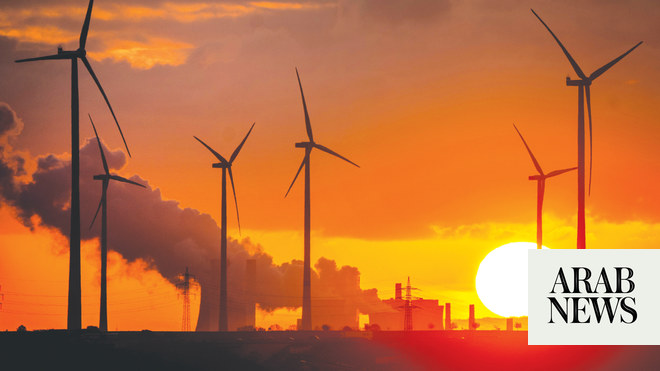
Renewable energy is set for an unprecedented boom in the US in the wake of its first ever climate bill, with the capacity of solar and wind projects expected to double by the end of the decade and providing the bulk of total American electricity supply, new analysis has shown.
The passage of the legislation, known as the Inflation Reduction Act (IRA), will help propel the US towards the forefront of the clean energy economy, experts predict, helping it compete with China on the manufacturing and installation of solar panels, wind turbines, batteries and emerging zero carbon technology.
The tax credits contained in the bill’s $370bn of climate spending should help double the capacity of installed wind and solar by 2030, according to an updated analysis by the research firm Energy Innovation. This extra resource could enable clean electricity to provide anything from 72% to 85% of total US supply by this time, flowing from 795 to 1,053 gigawatts of cumulative solar and wind capacity.
“This bill is going to make it very cheap to create clean electricity – you are going to get an incredible amount of deployment of solar and wind,” said Robbie Orvis, a senior director of analysis at Energy Innovation.
“It will really unleash investment in renewables. It has all the incentives to grow the industry domestically. It’s a complete jump-start for renewables.”
About $180bn in extra capital investment in renewables could be spent by 2030, according to Energy Innovation. A separate research group, Rystad Energy, has forecast even more will be funneled into the sector – about $270bn – leading to hundreds of thousands of new jobs. “The Inflation Reduction Act is a game changer for the US wind and solar industry,” said Marcelo Ortega, renewables analyst at Rystad.
Previously, wind and solar developers had to rely upon short-term tax breaks and partner with banks or other large institutions. The new bill provides the certainty of a 10-year tax credit program and allows the credits to be transferrable to the developers themselves. There is also billions of dollars for the domestic manufacturing of clean energy components, as well as rebates for people to buy electric cars.
The White House has said the legislation will save the country as much as $1.9tn in climate-related costs by the mid-point of the century, through reduced deaths and property damage caused by extreme heat, floods, drought and wildfires. Joe Biden has called the bill an “historic moment” and has vowed to slash US emissions in half this decade.
Climate campaigners have welcomed the legislation as a long-overdue breakthrough, although they have criticized aspects of the legislation that throw open large areas of public lands to oil and gas drilling. The concessions to fossil fuels were borne from a compromise struck with Joe Manchin, the centrist Democrat and key swing senate vote who has received more money in donations from the oil and gas industry than any other senator.
Still, even with the extra land and waters given over to drilling, several different analysts have forecast that the US should cut its planet-heating emissions by about 40% by the end of this decade, boosting the global effort to stave off disastrous climate change.
Such predictions could, however, be hampered by variables such as the supply chain problems currently hampering the production of electric vehicles, economic downturns, problems in building out transmission infrastructure to move clean electricity around the country and resistance from local communities to new wind and solar developments.
“Every single number has to be taken with a big grain of salt. There are a lot of big assumptions, but taken together these analyses all show this bill is a big deal and I agree with that,” said James Stock, an economist at Harvard University.
“We need to make sure these projects are built – if we go into traditional American project gridlock, that will be a problem. But this promises to be a transformational moment – we will see decarbonization this decade, which is very exciting.”
The spending is likely to catch the attention of China, the leader in clean energy production. “It’s clear that the Inflation Reduction Act will push the clean energy race into overdrive,” said Gernot Wagner, climate economist at Columbia Business School.
“The specific impact, of course, is anyone’s guess. That’s especially true because the IRA isn’t just a continuation of past policies. It’s a policy tipping point – and a positive one at that.”










